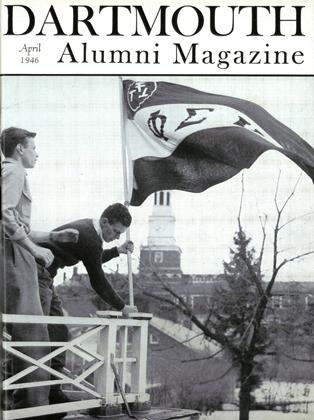Start of Alumni Fund Campaign Increases Interest in New Building
PLANS FOR THE "HOPKINS WAR MEMORIAL" were substantially furthered last month by the start of the Alumni Fund campaign and announcement by President Dickey of other steps toward realization of the College's postwar building goals. John W. Hubbell '21 of New York City will head a special gifts committee to supplement the regular Alumni Fund campaign which this year has as one objective a major contribution toward the new auditorium and physics buildings. President Dickey and Thomas P. Campbell '18 of Denver, president of the Alumni Council, appointed Mr. Hubbell to direct a national campaign for the postwar program. Under his direction committees of Dartmouth men throughout the country are being established to participate actively in the drive to secure substantial support through special gifts from friends of the College outside the alumni body.
The Alumni Fund Committee sent its first message to all Dartmouth men last month stating the Fund's traditional and vital role of bridging the gap between income and expense in annual operations of the College. Alumni are also urged to add a "plus" contribution to their regular gifts to be applied toward the over-all objective for postwar projects, which include the Hopkins Scholarships in addition to the building program.
At its January meeting the Board of Trustees voted to add the auditorium and physics building to the physical plant of the College as soon as building conditions permit. The Alumni Council recommended that the reconversion reserve fund of nearly $800,000 be appropriated toward the total financial requirements of more than $2,000,000 for the construction program. The Council also suggested that studies and architect's plans for the auditorium structure be reviewed to provide maximum daily use through increased social and recreational facilities for students, faculty, and alumni.
In accordance with the desires of the Alumni Council, and as voted by the Board of Trustees, the new auditorium building will bear the name of President-Emeritus Ernest Martin Hopkins. There are numerous opportunities in the plans for establishing memorials, by classes or individuals, to Dartmouth men who gave their lives in military service.
President Dickey has announced the appointment of a committee advisory to the Trustee Committee on Maintenance and Development of the Plant, of which Edward S. French '06 is chairman and the other members are Harvey P. Hood '18, and Dr. John F. Gile '16, the President and the Treasurer. The new advisory group, asked by the President to assist on final plans preparatory to construction, is composed of Prof. Russell R. Larmon '19, chairman; Halsey C. Edgerton '06, treasurer of the College; Sidney C. Hayward '26, secretary of the College; Prof. John H. Minnich '28, of the Thayer School faculty; Warner Bentley, graduate manager of the Council on Student Organizations; and J. Fredrick Larson, College architect.
Members of the Department of Physics have made plans in consultation with Mr. Larson for the new laboratory building which will bring Wilder Hall's antiquated and inadequate facilities up to date. The structure will be about equal in size to the present building and will adjoin it on the north side.
The need for an auditorium large enough to accommodate the entire student body and faculty has also long been recognized as one of the most pressing of the requirements for strengthening the plant of the College. In 1929 a committee headed by Dean Robert C. Strong '24, then executive assistant to President Hopkins, studied the need for a student union. Plans for the development of "Dartmouth House," to occupy the entire south end of the campus, were proposed by the committee but the great cost of the project and the decision to retain the Hanover Inn's present location prevented adoption of the plan. Subsequently Thayer Hall was built to provide eating facilities for upperclassmen, with Commons continued as the freshman dining hall.
In 1937 President Hopkins asked a committee of nine College officers to plan a structure to house auditorium, theater, musical and dramatic facilities—units which had earlier been recommended by the Dartmouth House committee. The "Dartmouth Center of Music, Drama and Radio" evolved from the work of the committee which was headed by Mr. Hayward. Prof. Benfield Pressey was secretary of the planning group and other members were Mr. Bentley, Albert I. Dickerson, Mr. Edgerton, Mr. Larson, Prof. Maurice F. Longhurst, Dean Lloyd K. Neidlinger, and Prof. E. Bradlee Watson.
Recognizing the need for the earliest possible realization of the project after the war, President Hopkins last year asked the committee to review its earlier studies, and those results are now available to the new committee. Conditions do not permit starting construction this year but it is hoped that foundations, on the present site of Bissell Hall, may be laid in 1947-48. Earlier committees engaged in planning the new building have recognized the value of surrounding the auditorium with facilities for curricular and extra-curricular activities. The objective is to give maximum daily usefulness to the Hopkins War Memorial with emphasis on varied uses that will interest and benefit the entire College community and alumni visitors.
ARCHITECT'S EXTERIOR PLAN FOR THE HOPKINS WAR MEMORIAL, SHOWING ITS RELATION TO THE HANOVER INN AT THE RIGHT
 View Full Issue
View Full Issue
More From This Issue
-
 Class Notes
Class Notes1918
April 1946 By ERNEST H. EARLEY, DONALD L. BARR -
 Article
ArticleLabor Marches With the Times
April 1946 By MALCOLM KEIR, -
 Article
ArticleTHE NEW CURRICULUM
April 1946 By PROF. HUGH S. MORRISON '26, -
 Class Notes
Class Notes1917
April 1946 By MOTT D. BROWN, DONALD BROOKS -
 Class Notes
Class Notes1911
April 1946 By NATHANIEL G. BURLEIGH, EDWIN R. KEELER -
 Article
ArticleEducational Aims
April 1946 By PROF. CHARLES LEONARD STONE '17








